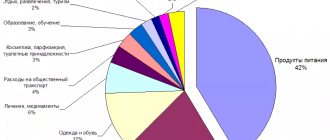Compensation for housing and communal services is one of the most common measures of assistance offered by state social protection. One of its main advantages is that many people can receive it, not just a small percentage of citizens. In 2022, from January 1, they plan to introduce changes to the current legislation on this issue. Therefore, citizens who are interested in receiving compensation for housing and communal services should familiarize themselves with the innovations.
Typically, compensation for housing and communal services is intended for low-income citizens, but it will not be possible to receive payments automatically just because you belong to a certain segment of the population. Compensation must be processed by collecting a standard set of documents (including an application), contacting government agencies and receiving a decision to receive compensation for housing and communal services payments.
Registration of assistance from the state is often associated with a variety of working bureaucratic issues. It is difficult for an ignorant person to understand them, so he will not receive compensation, although in fairness he can count on it. That’s why it’s so important to understand in advance the new rules for receiving compensation for housing and communal services, which come into force on January 1, 2022. If you are prepared, you will be much less likely to be refused when applying for compensation for utility bills. Especially when we are talking about pensioners, veterans or the poor, for whom the subsidy in question was intended.
Benefits and subsidies
Housing and communal services are a huge economic complex. We all deal with him because we use his services. It includes enterprises supplying electricity, heat, and water.
In addition, there are organizations that take care of the housing stock. Each one works for the population, charging a fee for their work.
All these organizations provide housing and communal services. The state is trying to financially support socially vulnerable citizens awaiting help.
This is done in two ways:
- accrual of benefits;
- subsidies.
These are different types of support. The first depends on the category of citizen, the second - on the share of housing and communal services payments in the total family income. People have the right to benefit from both types of assistance. In this case, you need to take into account:
- Benefits provide reduced payments.
- Subsidies to citizens are given in cash equivalent on a compensatory basis.
Benefits, as well as subsidies, are registered with the local social security authority.
Who is eligible for benefits in 2021?
There are two levels of preferences: local and federal. The state has established a list of citizens who are required to provide discounts in any case.
These include:
- Heroes of the Soviet Union or Russia;
- full holders of the Order of Glory;
- WWII participants, family members of deceased WWII participants/disabled veterans, war veterans, disabled war veterans;
- citizens awarded the title “Hero of Socialist Labor”;
- disabled relatives of military personnel who died in combat or as a result of diseases acquired in service;
- people affected by radiation who participated in the liquidation of accidents at nuclear power plants;
- disabled people of all groups;
- including disabled children;
- families caring for disabled children.
In the regions, they add their own to the main groups of beneficiaries. These may include:
- large and low-income families;
- orphans and children deprived of parental care;
- pensioners;
- labor veterans;
- people who survived the siege of Leningrad;
- minor prisoners of concentration camps;
- home front workers during the Second World War;
- employees of budgetary organizations;
- repressed citizens and others.
Each region has its own list of beneficiaries. You should check it on the official website of the relevant government.
Legal regulation of preferences in the capital
The provision of concessions throughout the country, including Moscow, is regulated by the provisions of Article 159 of the Housing Code. This norm reflects the list of persons who are entitled to use benefits. The process of obtaining privileges is prescribed in the Decree of the Government of the Russian Federation No. 761 of 2005 “On the provision of subsidies for payment...”.
In the capital, the provisions of Law No. 70 of 2004 “On Social Support Measures...” and Moscow Government Decree No. 889-PP of 2015 “On the approval of prices, rates and tariffs...” are applied.
With regard to benefits related to waste removal, Government Decree No. 850-PP of 2004 “On the procedure and conditions for ensuring...” applies. The listed acts reflect categories of citizens who, in addition to federal beneficiaries, can enjoy preferences in Moscow.
Who determines the list of preferences
Benefits for paying for housing and communal services in Moscow are determined by local governments. However, the basis for establishing preferences for citizens is regulated by the Government of the capital.
The list of persons entitled to use exemptions is approved by the specified body and is subject to annual revision . In this situation, the rule is taken into account according to which regional legislation should not contradict municipal legislation.
Benefit mechanism
Discounts are issued by citizens individually.
They are taken into account from the 1st day of the month following the date of application. Discounts are calculated taking into account prices, tariffs and housing and communal services standards. They apply to the following types of services:
- For housing:
- maintenance and repair thereof;
- including major repairs;
- use of square meters;
- renting an apartment;
- Water supply and disposal (sewage).
- Electricity.
- Heating.
- Gas supply.
Discounts are issued only for one accommodation. If several beneficiaries live in an apartment, they can claim their rights to different types of housing and communal services. Preferences are provided by registration. If a citizen wishes to be registered at their actual address of residence, he must provide a certificate stating that registration discounts are not taken into account.
In the case where one citizen legally has several types of benefits, he can receive only one discount of his choice.
Types of social norms with examples
All norms can be divided into a number of main groups:
- Customs are rules that have developed historically due to repeated repetition. For example, one of the wedding customs in Russia is this: the groom, taking the bride from her father’s house, must give a ransom for her.
- Social traditions are almost the same as customs, but they can arise spontaneously, that is, they do not require repeated repetition to become such. This type of rules is more like following fashionable trends that are widespread in society. Someone set an example, everyone repeated it - a tradition was born.
- Business rules take place in work and educational activities. An example of social norms in this case is the greeting of the teacher by students: when the teacher enters the classroom, everyone is required to stand up, say hello, and then take their seats.
- Religious - established by each confession for its adherents (who is this?) and recorded in the sacred books. For example, in Christianity it is the Bible, in Islam it is the Koran.
- Corporate norms are born in separate groups, such as workers, public organizations, cooperatives, parties and others. These rules are supported by law and are designed to regulate interaction between participants, protecting their rights and interests.
- Moral standards are based on concepts of good and evil; failure to comply with them entails public censure.
- Legal norms are legally enshrined and are considered binding. Failure to comply is punishable by law.
- Aesthetic - rules of good manners, requirements for appearance (clothing, hairstyle, hygiene, etc.)
Here are more examples of different types of rules of social behavior:
Also, types of social norms are divided into formal and informal . The first ones are fixed at the legal level: their violation will lead to problems with the law (a fine for a broken window). The latter exist on the “word of honor”, the good will of the individual (in theory, you cannot take someone else’s wife away from the family, but if you really want to, then you can).
More examples of social relations are divided according to the degree of mandatory execution:
- prohibiting - something that cannot be done. For example, smoking and drinking alcohol in public places;
- incentive – stimulating individuals to fulfill norms (example: bonuses, extra points on the Unified State Examination);
- recommended - optional, but desirable behavior (for example, paying a loan on time);
- imperative – types of social norms that must be followed (a doctor is obliged to treat, a president is obliged to lead his country).
Based on the scale of the social group to which the rules apply, the following division can be made (examples are shown in the last column):
Discount amounts
Preferences for payment of housing and communal services are included in the laws describing the situation of the corresponding category of citizens.
Thus, Article 28.2 of the Federal Law of November 24, 1995 No. 181-FZ “On social protection of disabled people in the Russian Federation” describes discounts for disabled people. According to this act, they apply to the entire family. These citizens receive a 50% discount on all types of utility bills. That is, the budget pays half of the amount for them.
Preferences for people with disabilities are accrued based on actual consumption of services, but not more than consumption standards.
Download for viewing and printing Federal Law No. 181-FZ of November 24, 1995 – On the social protection of disabled people in the Russian Federation
Benefits for veterans and military personnel
This large population group is also divided into categories. They differ in the size of discounts on housing and communal services.
The main benefits are prescribed in Federal Law No. 5 of January 12, 1995 “On Veterans” and Federal Law No. 181-FZ of November 24, 1995 “On Social Protection of Disabled Persons in the Russian Federation.”
Thus, half of the amounts are awarded to citizens belonging to:
- war invalids;
- combat veterans;
- participants of the Second World War.
The above categories of citizens have a 50% discount on rent. It is worth noting that the benefits also apply to family members living with them.
There are categories of honored citizens for whom the budget pays all utility bills. These include:
- Heroes of the USSR or the Russian Federation.
- Full Knights of the Order of Glory.
Preferences apply to all family members of these persons.
Discounts can only be used for one apartment.
Download to view and print
Federal Law “On Veterans” No. 5 dated January 12, 1995
Large families
The state is interested in population growth. It classifies families with more than three children (under 18 years of age) as having many children and socially vulnerable.
At the regional level, they establish benefits for paying for housing and communal services.
As a rule, the budget pays 30% of the bills for them, which are calculated based on consumption standards. But this depends on the composition of the family.
For example, in the Perm Territory, regional authorities provide monthly monetary compensation for expenses for housing and communal services in the amount of 292.94 rubles. for each family member. In the Udmurt Republic, 30% of utility costs are compensated, which is calculated within the republican standard of social norms.
If there are no benefits for large families in the region, then you need to apply for a subsidy. Most often it is reserved for large families.
Single mothers
As such, no benefits are provided to this category of citizens. However, women raising children on their own are entitled to subsidies. These preferences apply to all types of housing and communal services.
You must submit an application to the social security authority at your place of residence.
Social norms for calculating benefits and benefits for housing and communal services
The amount of the benefit is individual in each case, depending on the specific region or category of beneficiaries. Federal payments covering the full cost of utilities and rent are provided to heroes of the Soviet Union, Russia, labor, and holders of honorary orders. An increase of 50% to pay for utility services and major repairs of residential premises is provided to:
- To the Chernobyl liquidators, widows of Chernobyl victims.
- Disabled people of war.
- WWII veterans.
- Disabled people of groups 1 and 2, families with a disabled minor child.
Monthly compensation for utilities and housing costs is provided to employees of the educational sector, managers or deputy managers of state-owned enterprises who work under a contract in a village or town.
Subsidies
Subsidies for housing and utility bills are provided to citizens if their expenses for housing and communal services exceed the amount corresponding to the maximum allowable share of citizens’ expenses in this area. For these purposes, the size of the regional standard for the standard area of residential premises and the size of the regional standard for the cost of housing and communal services are used.
The following are eligible for subsidies:
- residential users;
- tenants under residential lease agreements;
- members of housing cooperatives;
- owners of residential premises.
The main condition for calculating the subsidy is the absence of arrears in payment for housing and communal services or the fulfillment by citizens of agreements on its repayment.
The subsidy is calculated every six months and is adjusted taking into account the consumption of services.
List of documents to receive a subsidy:
- passports and birth certificates of all family members;
- documents confirming the right to use residential premises;
- documents confirming the absence of arrears in payment of utility services;
- certificate of family composition;
- income certificates for all family members.
The list of documents may be supplemented at the discretion of regional authorities.
Deadlines for consideration and period of validity of the subsidy
Social security authorities must make a decision on granting preferences within 10 days. If the application is submitted with comments and all documents have not been collected, the review period may be 30 days. It is important to know:
- subsidies for persons whose housing and communal services expenses exceed 10% of income are provided only for six months; subsequent re-registration is necessary;
- compensation for beneficiaries at the federal and regional levels is permanent.
You can lose preferences for the next period if you increase your income or change your place of residence.
If a positive decision is made to pay subsidies for housing and communal services, Muscovites receive money to their account or bank card. There are features of accruals:
| Application deadline, dates of month | Subsidy accruals begin on the 1st of the month |
| 1–15 | current |
| from 16 | next |
Process of receiving discounts
Benefits for payments for housing and communal services are not automatically provided to anyone. Citizens entitled to them must contact the territorial department of social protection of the population.
You must have the following documents with you:
- passport;
- beneficiary certificate;
- document on the ownership of housing or a social tenancy agreement;
- checks for payment for services;
- certificate of family composition.
Benefits are provided exclusively to citizens of the Russian Federation.
Documents confirming the right to a discount include:
| Category | Document |
| Disabled people | Certificate of disability assignment |
| Veterans, disabled people, WWII participants | Relevant ID |
| Combatant | |
| Knights of the Order | |
| Heroes of Russia, USSR | |
| Family members of fallen servicemen | |
| Home front workers, concentration camp prisoners | |
| People who survived the siege of Leningrad | |
| Honorary donors of the Russian Federation, USSR | |
| Repressed citizens | |
| Radiation victims | |
| Veterans of Labor | |
| Orphans and children deprived of parental care | Certificate of preferential category |
| Large families | Birth certificates of children |
Documents confirming regional preferences can be found in the resolution of the local government on its official website.
Rent benefits
In many cases, discounts are based on consumption standards. They are established by the regional authorities. But there are cases when this restriction does not apply.
For example, let's look at the capital's legislative acts. Thus, the Moscow Government has established that rent discounts are calculated based on the following area sizes:
- per person - 33 sq. m;
- for two - 42 sq. m;
- for three or more - based on 18 sq. m per person.
Calculation example
Let’s say four citizens live in an apartment, one of whom is disabled since childhood. Social housing standard for them: 18 sq. m x 4 people = 72 sq. m.
This is the area the discount will apply to.
For meters exceeding the social norm, you will have to pay full price.
Who does this procedure not apply to?
The regulations indicate the categories of citizens who are granted the right to discounts on the entire area of the apartment, without taking into account social norms.
The metropolitan government included the following:
- single pensioners;
- disabled people living alone;
- minor orphans who own apartments;
- families that include only disabled people or pensioners and children under 16 years of age;
- large families who live in low-rise buildings owned by the city.
Each region has its own list of exceptions and preferences. It is necessary to learn about the subtleties and nuances of legislation in service provider organizations.
Functions of rules of social behavior
Social norms in society perform three functions:
- Regulation - rules regulate all kinds of behavioral models: they encourage, encourage approved and condemn, limit negative ones (for example, traffic rules: driving into the oncoming lane is prohibited).
- Socialization - help an individual (who is this?) to become a full-fledged member of society, facilitate his “infusion” (example: Petya knows that he should not beat girls, for this he is respected in the class).
- The evaluative function divides actions, from an informal point of view, into good and bad, legal and illegal, and law in the system of social norms indicates their legality or illegality.
Additional benefits for pensioners
As a rule, a pension is not yet an opportunity to count on state assistance in paying for housing and communal services. The authorities support only socially vulnerable people.
Pensioners in general are not classified as such. However, most of them have the opportunity to reduce their expenses. So, if a retired family lives in an apartment, then it is worth applying for a subsidy. This type of support is assigned if spending on housing and communal services exceeds 22% of total income.
The subsidy is valid for six months. That is, she will be appointed for six months. When this period ends, you will need to update your application and documents confirming your right to discounts. Since the end of 2018, beneficiaries have been exempted from the obligation to document the absence of debts for housing and communal services. This will be done by the officials themselves.
Regions also establish their own ways of supporting pensioners. Thus, in Moscow, visually impaired people (groups 1 and 2) are not charged for a radio point. A 50% discount on the use of a TV antenna is established for:
- disabled people living alone;
- persons who are assigned a subsidy for housing and communal services;
- families consisting only of pensioners.
Benefits for paying housing and communal services for disabled children
A special social stratum of the population is represented by disabled people who need government support like no other. Therefore, they have the right to believe that the state can provide them with social projects aimed at helping and adapting to society.
The legislation of the Russian Federation provides for the provision of benefits not only for the disabled themselves, but also for families raising children of disabled people. According to these laws, the service of any public utility is provided in the amount of 50% of the full cost, regardless of the residence of the disabled person. If a disabled person lives in a private house, then he is entitled to a discount on fuel materials.
These benefits are provided both at the federal and local levels. If the house in which a disabled person lives is municipal property, then housing and communal services compensation is provided by local authorities.
No government body can refuse a disabled person to receive compensation for housing and communal services if they have been provided with a full package of documents approved by the legislation of the Russian Federation. In case of refusal, you have the right to go to court.
Discounts and preferences for state employees
Doctors and teachers working in villages also have benefits on payments for housing and communal services. However, the mechanism for their purpose and accounting is somewhat different. It differs depending on the region; most often, state employees receive an “increase” in their salary once a year. That is, they are compensated with money for payments already made.
According to the decree of the Government of the Russian Federation, calculations are based on national averages. It is equal to 1200 rubles. per month.
Regional authorities may apply increasing or decreasing factors to this average based on specific local living conditions.
The difference between a benefit and a subsidy
Many citizens who prepare documents to receive benefits confuse the concepts of preferential accrual and subsidy. However, it is worth noting that subsidies and benefits for paying the costs of housing and communal services are not the same thing. A benefit is financial support from the state, a discount on utility costs, the amount of which depends on the region of residence or the benefit category. Such discounts are provided to certain segments of the population, for example, war veterans, large or low-income families.
The housing and communal services subsidy covers part of the utility costs; the amount of payments is calculated based on the total family income. The subsidy is awarded if the family’s income does not exceed the threshold established for the region. For example, the national average for compensation is 22%. If the family’s total spending on services is equal to 23% or more, you can apply for social benefits.
It is also worth noting that preferential assistance is assigned to a specific person or family for a long period of time, for example, until the youngest minor member of the family reaches the age of majority. Documents for the subsidy must be updated every six months; if income increases, payments may not be assigned.









